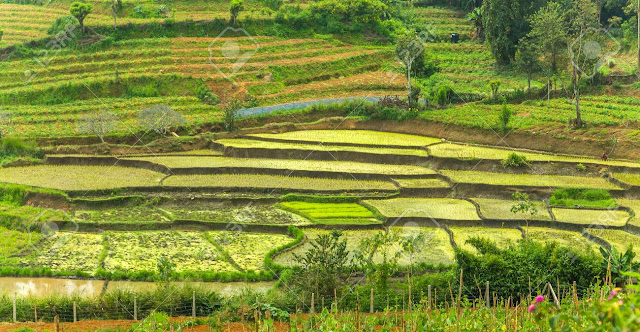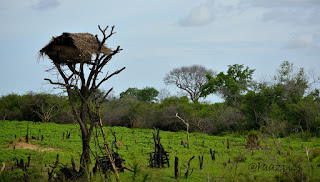What is Agriculture?
Agriculture is the art and science of cultivating the soil, growing crops and raising livestock. It includes the preparation of plant and animal products for people to use and their distribution to markets. Agriculture provides most of the world’s food and fabrics; cotton, wool, and leather are all agricultural products. Agriculture also provides wood for construction and paper products.
Agriculture is the science of growing crops and raising animals to meet the food, fiber, fuel, and other needs of humans.
Agriculture is the art and science of cultivating the soil, growing crops and raising livestock. It includes the preparation of plant and animal products for people to use and their distribution to markets. Agriculture provides most of the world’s food and fabrics; cotton, wool, and leather are all agricultural products. Agriculture also provides wood for construction and paper products.
Agriculture is the science of growing crops and raising animals to meet the food, fiber, fuel, and other needs of humans.
These products, as well as the agricultural methods used, may vary from
one part of the world to another.
Other definitions related to agriculture CLICK HERE
This definition used here as a
compressed answer to the main question what is agriculture. It describes
agriculture as both an art and a science (needs skill and founded on
scientifically verified facts) and thus includes specialized disciplines; the
words “growing” and “raising” are descriptive of enterprise*, activity or
practice. It has two main divisions: plant or crop production and animal or
livestock production; and it’s ultimate purpose is for food production, other
human needs such as clothing, medicines, tools, artistic display and dwelling,
or for economic gain or profit.
(Enterprise is a project undertaken or to be undertaken, especially one that is important or difficult or that requires boldness or energy and synonymous with plan, undertaking, or venture).
In relation to crop farming and livestock farming, the term “agriculture” may be defined as: the art and science of growing plants and other crops and the raising of animals for food, other human needs, or economic gain .
This definition used here as a compressed answer to the main question what is agriculture. It describes agriculture as both an art and a science (needs skill and founded on scientifically verified facts) and thus includes specialized disciplines; the words “growing” and “raising” are descriptive of enterprise, activity or practice. It has two main divisions: plant or crop production and animal or livestock production; and it’s ultimate purpose is for food production, other human needs such as clothing, medicines, tools, artistic display and dwelling, or for economic gain or profit.
It is admitted that no definition
can be exacting for everybody and for all purposes. Nevertheless, I find this
elucidation on what is agriculture specially convenient where its coverage is
limited to crop production (agronomy and horticulture) and livestock production
even knowing that some definitions include fisheries, forestry, and other
activities. Further, the science of agriculture is dynamic.
For more details and perspectives, given below are 8 definitions of
agriculture from various sources. This list is not exclusive.
1. Agriculture is the systematic
raising of useful plants and
livestock under the management of man.
2. Agriculture is the
growing of both plants and animals for human
needs.
3. Agriculture is the
deliberate effort to modify a portion of Earth's
surface through the
cultivation of crops and the raising of
livestock for sustenance or economic
gain.
The next 6 definitions give more insights on what is
agriculture. These are presumably for legal purposes or applied in legal
disputes.
4. Agriculture includes
farming in all branches and, among other things, includes the cultivation and
tillage of soil, dairying, the production, cultivation, growing and harvesting
of any agricultural and horticultural commodities, the raising of livestock or
poultry, and any practices performed by a farmer on a farm as an incident to or
in conjunction with such farming operations, but does not include the
manufacturing or processing of sugar, coconuts, abaca, tobacco, pineapple or
other farm products.
5. Agriculture, Agricultural
Enterprise or Agricultural Activity means the cultivation of the soil, planting
of crops, growing of fruit trees, including the harvesting of such farm
products, and other farm activities and practices performed by a farmer in
conjunction with such farming operations done by persons whether natural or
juridical.
6. “Farming” or
“agriculture” shall include farming in all of its branches and the cultivation
and tillage of the soil, dairying, the production, cultivation, growing and
harvesting of any agricultural, aquacultural, floricultural or horticultural
commodities, the growing and harvesting of forest products upon forest land,
the raising of livestock including horses, the keeping of horses as a
commercial enterprise, the keeping and raising of poultry, swine, cattle and
other domesticated animals used for food purposes, bees, fur-bearing animals,
and any forestry or lumbering operations, performed by a farmer, who is hereby
defined as one engaged in agriculture or farming as herein defined, or on a
farm as an incident to or in conjunction with such farming operations,
including preparations for market, delivery to storage or to market or to
carriers for transportation to market.
More on What is Agriculture: Definition from Court Decisions
7. Agricuture is the science of
cultivating the soil, harvesting crops, and raising livestock and also as the
science or art of the production of plants and animals useful to man and in
varying degrees the preparation of such products for man's use and their
disposal.
all its branches and among other things includes the cultivation and tillage
of the soil, dairying, the production, cultivation, growing, and harvesting of
any agricultural or horticultural commodities, the raising of livestock or
poultry, and any practices performed by a farmer on a farm as an incident to or
in conjunction with some farming operations, but does not include the
manufacturing or processing of sugar, coconuts, abaca, tobacco, pineapples or
other farm products.
2. So,
once more, what is agriculture?
The first 3 are scientific and
practical definitions while numbered 4 to 8 are legal definitions of
agriculture. These last 6 give more details on what is agriculture by
enumerating the activities covered by the enterprise or practice. That
contending parties have found the necessity to elevate to the Court
controversies in relation to what is agriculture only underscores the
uncertainty some feel for the term. The following conclusions can be made from
these definitions and from those of specialized fields under agriculture:
1. Agriculture is an enterprise or
business, activity or practice. It is synonymous to farming.
2. The practice of agriculture is
based on systematized body of knowledge (science) and requires skill (art).
3. Agriculture often involves the
cultivation of the soil to grow plants and the raising of animals for human
needs. The words “crops” and “livestock” are also used. However, both words are
special or technical terms. “Crops" should clearly mean plants (with
exceptions, as in mushroom) which are useful to man while
“livestock” applies to both domesticated animals and poultry. However, cultivation
which essentially involves disturbing the soil does not apply to crop
production systems using soil-less media, as in hydroponics.
4. Agriculture is practiced for the
purpose of producing food and other human needs such as clothing, shelter,
medicines, weapons, tools, ornaments, and indefinitely many more. It is
likewise practiced as a business for economic gain. The ultimate purpose is
essentially important in clarifying what is agriculture.



Looking for Land Clearing in Laconia, Belknap County and McKenney, Carroll County.
ReplyDeleteContact Forestry Mulching Pros at 404-586-4272.
DeleteSummary of 8 types of agricultural land that you should know
ReplyDeleteLand clearing in Dallas Texas has never been easier thanks to the professional services offered by skilled companies in the area. Whether you need land clearing for residential or commercial purposes, these experts have the equipment and experience to handle any job, big or small. Clearing land can be a complex and challenging process, but with the right team on your side, you can ensure the job is done safely, efficiently, and with minimal impact to the environment. Contact a reputable land clearing company in Dallas Texas today and take the first step towards your next construction or development project.
ReplyDeleteNice Information on Regenerative Agriculture
ReplyDeleteFantastic post! Agriculture and horticulture require the right growing mediums, and companies like Keltech Energies are making it easier with their high-quality cocopeat, vermiculite, and Perlite. Appreciate your efforts in spreading awareness!
ReplyDeleteChoosing the right PP bag manufacturer can make a significant difference in your logistics and product safety. We've switched to a company that delivers consistent quality and customization for our product lines. The bags are ideal for both industrial and agricultural use.
ReplyDeleteInteresting perspective! It’s always eye-opening to explore how farming connects deeply with local communities and economies.
ReplyDeleteBest Plant Growth Regulators.
Great overview of sustainable agriculture’s multifaceted strategies! While traditional approaches emphasize efficiency and soil health, modern research shows success hinges on integrating adaptive management, economic viability, and holistic systems thinking with sustainable crop protection. The challenge lies not in picking one method, but in weaving together crop planning, resource stewardship, farmer knowledge, and community collaboration. Truly, only by embracing this blend of innovation and ecological wisdom can we build farms that sustain both people and planet.
ReplyDeletefantastic blog about agriculture, if you want to know more about farmlands please Read More here.
ReplyDeleteSustainable farming is our future, Read More here. for more about the same.
ReplyDeletegreat information, Read more here about the same
ReplyDelete